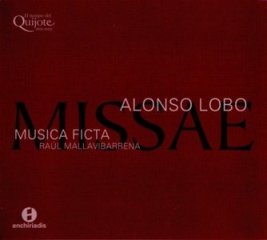Alonso Lobo - Missa Simile est regnum caelorum, Missa Petre ego prote rogavi (2016)
Alonso Lobo - Missa Simile est regnum caelorum, Missa Petre ego prote rogavi (2016)

01 - [Francisco GUERRERO] - Simile est regnum caelorum Missa SIMILE EST REGNUM CAELORUM 02 - Kyrie 03 - Gloria 04 - Credo 05 - Sanctus 06 - Agnus Dei 07 - [Francisco GUERRERO] - Petre ego prote rogavi Missa PETRE EGO PRO TE ROGAVI 08 - Kyrie 09 - Gloria 10 - Credo 11 - Sanctus 12 - Agnus Dei 13 - Vigo ego, dicit Dominus Musica Ficta (Ensemble): Eva Juárez - soprano Pilar Moral - soprano (#6, 11, 12) Marta Infante - contralto Miguel Bernal - tenor Luis Vicente - bajo Héctor Guerrero - bajo (#6) María Crisol - bajón Raúl Mallavibarrena - direction
Alonso Lobo (1555–1617) spent his life in service to church music, beginning as a choirboy in the Seville cathedral, where he studied under Francisco Guerrero as early as the age of 11. He soon became a canon and choir director at the collegiate church of his native Osuna. He returned to Seville as master of the choirboys in 1591, became maestro at the Toledo cathedral two years later, and then succeeded Guerrero in Seville in 1604.
We have had three of his masses on CD. The former of these two was already available from David Trendell (26:5), but the other mass on this disc is new, so we now have four of the six settings that he published in 1602. Both of these are parody masses based on motets of Francisco Guerrero (1528–1599), his teacher. (While Guerrero wrote three motets and a mass set to “Simile est regnum caelorum,” he is said to have based his own mass on the motet of his teacher Morales.) The three motets recorded here, including an extra motet by Lobo, all use sayings of Our Lord as set down in the gospels. “Simile” is the parable of the landowner who hires men to work in his vineyard. “Petre” is Our Lord’s prayer for Peter’s faith and strength after the Resurrection. “Vivo” is Our Lord’s desire for the conversion of sinners.
Mallavibarrena uses one voice to a part, supported by a bajón (dulcian) that is almost inaudible. As a collection of Lobo’s music, this compares most favorably with Peter Phillips and Trendell. As a figure in the generation after Victoria and Guerrero, his music preserves the richness of Renaissance polyphony while extending the harmonic language and dramatic expressiveness of the vocal lines. His music was performed long after his death, as far away as the Spanish New World. Yet O quam suavis est in “El Siglo de Oro” (2:3) was only his second appearance on disc, the same motet having been recorded in Spain on Pax a decade earlier. This new disc adds a great deal to our knowledge of late-Renaissance Spain. ---FANFARE: J. F. Weber
This CD confirms the high calibre of Lobo's sacred polyphony: the excellent mixed choir present two masses (O rex gloriae and Simile estregnum caelorum, based on motets by Palestrina and Guerrero respectively, and printed in Madrid in 1602), together with a magnificent setting of the Lamentations and the motet Ego floscampi.
The masses have carefully honed vocal lines and that sense of vertical spaciousness that characterises the sacred polyphony of 16th-century Iberian composers. The choir sing with absolute conviction and total security, as if they really know the music rather than as if it were a very competent read-through. Trendell paces it all well, the tempo never seeming forced or plodding. The motet is deservedly popular, but the recently discovered six-voice setting of the Lamentations is an absolute winner, with meltingly beautiful suspensions, often in the upper voices, in the Hebrew letter sections; the choir again captures just the right degree of intensity without slipping into over-indulgence. The fresh sound of this student choir combines energy and clarity in a most appealing way. This fine recording will enrich anyone's collection of Renaissance polyphony. ---prestoclassical.co.uk
download (mp3 @320 kbs):
yandex mediafire uloz.to cloudmailru gett








